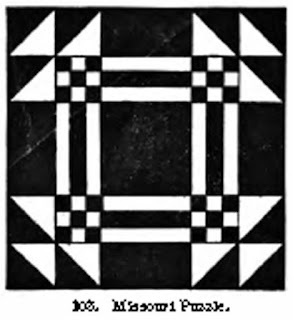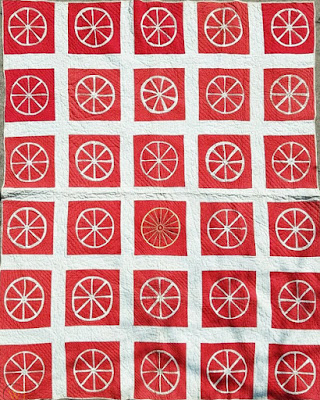I've been sorting my files of quilts dated in the 1890s.
There is no need to look at each year as the trends noted in 1891 continued.
Here are the quilts inscribed 1894.
See this post:
Album made for Benjamin Mead Wright
Kent, Connecticut
Red and white quilts remained popular.
A little over 20% of the cotton patchwork quilts that year are red & white (8 of 34).
The Steady Gleaners, Ontario, Canada
With Turkey red
outline embroidery continuing fashionable.
Silk embroidered fancywork---crazy quilts and other patterns---were a big fad.
Bethel Ladies' Aid Society
New Jersey Project & the Quilt Index
Memorial fundraiser by the Women's Relief Corps,
Antrim County, Michigan
Michigan Project & the Quilt Index
And fund-raising signature quilts embroidered...
and inked.
Depauville, New York
Quilters had access to increasingly diverse
patterns as the commercial network developed.
Patterns through the mail must have been quite novel.
Tree of Paradise
From the Ladies Art Company catalog which was
in print in 1894.
One could also find ideas in periodicals.
1890 article in Wide Awake Magazine
Missouri Puzzle was published in the Vickery & Hill
periodicals, perhaps read in the Oklahoma Territory.
Neck Tie from the Ladies' Art Company
Memory Blocks, Ladies' Art
The Ladies' Art Company catalog became quite important to the look of quilts. Wilene Smith makes the point that more elusive periodicals of the 1890s printed the patterns first and they may have been the source for some of these blocks. The pattern catalog of miniature blocks, however, was widely distributed and in print for decades after 1890 and it was probably the source for many of these designs.
1894 Union City, Tennessee
The pattern is Bear's Paw from the Ladies Art Company
done in the solids one sees in the Southern upcountry.
Was the brown once blue?
All solids, dated 1894, Barry County, Missouri
Did a red white and blue quilt fade?
One difference between the quilts of 1891 and those of 1894
is an increase in printed cottons.
Our sample is small but it looks like a quilter working
in 1894 had access to more cotton prints than she might have three years earlier.
Whether she was buying her fabric in Pennsylvania
Or elsewhere
Anna H. Burmeister, Milwaukee Wisconsin
International Quilt Museum
Rutland, Vermont
Floral cretonne as the border.
Solids were the thing to use in applique.
Names: Sarah Krause, Meiley
Wisconsin Project & the Quilt Index
1894 "BM MD"
Minnesota Project & the Quilt Index
Turkey reds and the increasingly unreliable greens
Marie L Rucksdaechel Seward County, Nebraska
Nebraska Project & the Quilt Index
Martha White Corry, Fort Worth Texas
Quilted later
Album samplers with a variety of signed blocks were not
as popular as they had been. This one uses solids and
cretonnes/chintz-scale florals.
It looks like New York style to me, where they continued this
fashion for quite a while.
It's the hearts & the horse that are so New York.
This one dated '94 is definitely from New York
Made for Joseph Bruno at the North River Hotel.
Another sampler with regional style:
The ELI quilt from the International Quilt Museum
"Presented by your Scholars
Sunnyside Ohio
1894"
The style here in solid colors (fading greens) with a distinctive eagle and an irregular make-do set has been traced to Ohio's Miami River Valley by Sue Cummings.
And one other trend:
Alphabet quilts
It looks like 1896 was a good year to be making quilts, whether
you were finding your patterns in print or from the neighbors
and your fabrics in your scrapbag or through the mail.
Log cabin signature quilt, Maine
Here are the rest of the 34 cotton patchwork quilts dated 1894:
From Merry Silber's collection of blue and white quilts.
DeWitt Church fundraiser from the Michigan Project
Boise City, Utah fundraiser found in Iowa
For the Reverend & Mrs. Simmons
Flora Methodist Church, Flora Indiana
The pattern is known as Children of Israel but not published until the 1930s,
which makes me wonder about the date.
Mary A. Miller Garman
Simple patchwork
Grandmother Hurff
And last "Grany Bear"
Who seems to have invented this pattern
Is this the repeat?
Or this block?


































































Thanks for the quilt show today. Another interesting read on how quilters over a century ago found their patterns and made extraordinary quilts.
ReplyDeleteSo many beauties on there. Lovely to see Grany Bear's design too.
ReplyDeleteWhat a wonderful array of pattern styles! (My father-in-law was born in 1894 so the year stood out for me.)
ReplyDeleteLove these quilts!
ReplyDeleteIt's so interesting to have a genealogy lesson with the pattern. I love these kinds of beautiful design. Thank you for all your research.
ReplyDelete